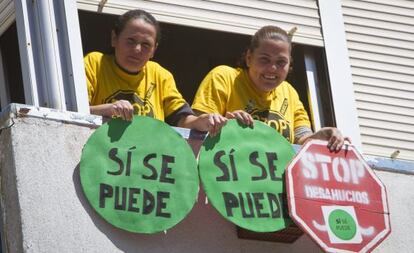Andalusia puts first embargo into place to halt woman’s eviction
New national law will give landlords option of fast-track ouster for tenants who don’t pay

Two developments in Spain’s dysfunctional housing market went in opposition directions on Thursday. On the one hand, the Andalusian government initiated an embargo on the home of a woman in financial straits who was facing eviction, while on the other the national parliament approved amendments to legislation governing the rental market that allows the fast-track ouster of tenants who fail to pay their dues.
The Andalusia region’s official gazette on Thursday announced proceedings to temporarily embargo the home of María del Carmen Andújar in Huelva following a request from her to stop the eviction proceedings initiated by a mortgage securitization corporation.
The firm, A Y T Mixto III, has 15 days to present its arguments against the embargo.
This was the first such action initiated by the Andalusian government after it approved a decree last month allowing for the seizure for up to three years of the homes of the neediest families facing eviction. Andújar met the criteria established for such embargos, which include having monthly income of under 542 euros and having suffered a significant deterioration in one’s financial situation subsequent to the mortgage being granted — such as the loss of employment — that causes the monthly burden to service the home loan to increase by at least 1.5 times.
The decree in Andalusia calls for a register of unoccupied homes owned by financial services and real estate companies to be established and for fines to be imposed if those homes remain unrented, as well as a pool of government-owned housing to rent to low-income groups.
Experts believe there could be up to six million empty homes in Spain
Over 80 percent of Spaniards own their own homes in a country where there is a lack of affordable housing for rent. Many people were priced out of the housing market by a property bubble that burst five years ago. Although prices have subsequently fallen, tight credit conditions, and more significantly an alarming jobless rate of 27.2 percent, are major obstacles to buying a home and maintaining ownership.
Many of those lucky enough to have been able to hold on to a job are trapped in homes with negative equity as a result of having bought during the bubble.
There has been a spate of evictions in Spain of late due to the ongoing economic crisis, with a number of cases of suicide involving those due to be evicted.
Under the new rental law passed by Congress on Thursday with the votes of the ruling Popular Party, which has an absolute majority in the lower house, and backed by the regional parties UPN and Foro Asturias, tenants who fail to pay their rent can now be evicted in 10 days if they fail to provide a judge with reasons for the eviction not to be executed.
The controversial new law also removes rent subsidies for low-income groups. The standard length of a rental contract has also been reduced from five years to three. Tenants can now abandon a rented property without financial penalty by providing the landlord one month’s notice, while the owner of a house that requires the property for himself or family members can repossess it by giving the tenant two months’ notice to leave.
The new legislation also establishes a register that blacklists tenants who have previously failed to pay their rent. This list can be consulted by potential landlords.
The Public Works Ministry, which is responsible for housing affairs and sponsored the law, said changes to the legislation were needed to make the rental market “more flexible.”
Experts believe there could be up to six million empty homes in Spain, or over 20 percent of the total. One of the arguments used to explain this phenomenon was the rental law. This legislation favored tenants, who were hard to evict legally — even when they failed to pay the rent.
Tu suscripción se está usando en otro dispositivo
¿Quieres añadir otro usuario a tu suscripción?
Si continúas leyendo en este dispositivo, no se podrá leer en el otro.
FlechaTu suscripción se está usando en otro dispositivo y solo puedes acceder a EL PAÍS desde un dispositivo a la vez.
Si quieres compartir tu cuenta, cambia tu suscripción a la modalidad Premium, así podrás añadir otro usuario. Cada uno accederá con su propia cuenta de email, lo que os permitirá personalizar vuestra experiencia en EL PAÍS.
¿Tienes una suscripción de empresa? Accede aquí para contratar más cuentas.
En el caso de no saber quién está usando tu cuenta, te recomendamos cambiar tu contraseña aquí.
Si decides continuar compartiendo tu cuenta, este mensaje se mostrará en tu dispositivo y en el de la otra persona que está usando tu cuenta de forma indefinida, afectando a tu experiencia de lectura. Puedes consultar aquí los términos y condiciones de la suscripción digital.








































